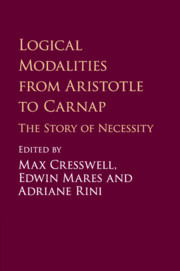Book contents
- Frontmatter
- Contents
- List of Figures and Tables
- List of Contributors
- List of Abbreviations
- Introduction
- 1 Aristotle on the Necessity of the Consequence
- 2 Aristotle on One- Sided Possibility
- 3 Why Does Aristotle Need a Modal Syllogistic?
- 4 Necessity, Possibility, and Determinism in Stoic Thought
- 5 Necessity in Avicenna and the Arabic Tradition
- 6 Modality without the Prior Analytics: Early Twelfth Century Accounts of Modal Propositions
- 7 Ockham and the Foundations of Modality in the Fourteenth Century
- 8 Theological and Scientific Applications of the Notion of Necessity in the Mediaeval and Early Modern Periods
- 9 Locke and the Problem of Necessity in Early Modern Philosophy
- 10 Leibniz's Theories of Necessity
- 11 Leibniz and the Lucky Proof
- 12 Divine Necessity and Kant's Modal Categories
- 13 Charles Sanders Peirce on Necessity
- 14 The Development of C. I. Lewis's Philosophy of Modal Logic
- 15 Carnap's Modal Predicate Logic
- Bibliography
- Index
Introduction
Published online by Cambridge University Press: 05 September 2016
- Frontmatter
- Contents
- List of Figures and Tables
- List of Contributors
- List of Abbreviations
- Introduction
- 1 Aristotle on the Necessity of the Consequence
- 2 Aristotle on One- Sided Possibility
- 3 Why Does Aristotle Need a Modal Syllogistic?
- 4 Necessity, Possibility, and Determinism in Stoic Thought
- 5 Necessity in Avicenna and the Arabic Tradition
- 6 Modality without the Prior Analytics: Early Twelfth Century Accounts of Modal Propositions
- 7 Ockham and the Foundations of Modality in the Fourteenth Century
- 8 Theological and Scientific Applications of the Notion of Necessity in the Mediaeval and Early Modern Periods
- 9 Locke and the Problem of Necessity in Early Modern Philosophy
- 10 Leibniz's Theories of Necessity
- 11 Leibniz and the Lucky Proof
- 12 Divine Necessity and Kant's Modal Categories
- 13 Charles Sanders Peirce on Necessity
- 14 The Development of C. I. Lewis's Philosophy of Modal Logic
- 15 Carnap's Modal Predicate Logic
- Bibliography
- Index
Summary
Philosophy investigates the basic structure of how things are. In addition, many philosophers have claimed that philosophy must also look at how things must be – that is, at what is necessary. But philosophers do not all agree about the nature of necessity and the related notion of possibility. In fact, these ‘modal’ notions are the focus of a debate which goes back to the earliest Greek philosophers, and many of the questions which the ancients asked about the nature of necessity can still be seen to occupy a central position in present-day philosophical discussion.
Some years ago when we three editors were reflecting together on current views about modality, possible worlds, and related issues, we started asking where philosophers through the ages have thought that necessity originates. What have they said necessity is? What do they say are its roots? We began to explore notions of necessity as they emerged in philosophers’ and logicians’ works over the centuries, and in doing so we were struck by the enormous range of different approaches to these topics, both from the point of view of contemporary metaphysics and from the point of view of the connection between logical inference and argument. We were also struck by the connection between the intuitive notions of necessity and the validity of ‘logical’ arguments in ordinary life. Even while these themes sit at the heart of much in philosophy, it seemed to us that the contemporary debates around them do not often suggest much awareness of the older philosophical discussions. And so we quickly came to feel the need for a more thoroughgoing study, one which is fundamentally historical and which brings together world experts on various philosophers and eras. We approached these experts seeking their guidance in looking back at the notion of necessity throughout its long history, and through close attention to the primary texts.
There are, we think, special advantages in taking the historical approach to a subject such as necessity. Not least among these advantages is the way in which the historical approach affords philosophers room for reflection, which allows us to sit outside the philosophical debates. However partisan one's views about modal reasoning might be, philosophers as a rule adopt a position of agnosticism when studying historical greats such as Aristotle or Abaelard or Locke or Leibniz.
- Type
- Chapter
- Information
- Logical Modalities from Aristotle to CarnapThe Story of Necessity, pp. 1 - 10Publisher: Cambridge University PressPrint publication year: 2016

